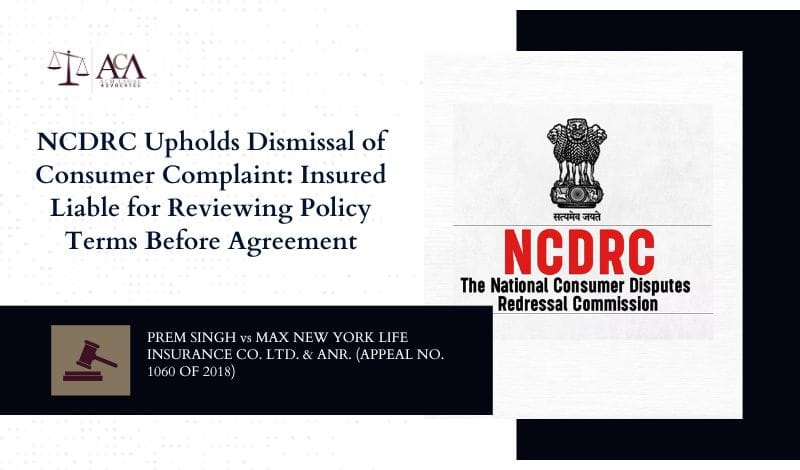PREM SINGH vs MAX NEW YORK LIFE INSURANCE CO. LTD. & ANR. (APPEAL NO. 1060 OF 2018)
Brief Facts of the Case:
The complainant, a retired employee, alleged that Max New York Life Insurance misrepresented their “Life Maker Premium Investment Plan” as a fixed deposit (FD) that would double in five to six years. Believing this, he made a single deposit but later discovered the policy had lapsed with no recoverable value due to non-payment of subsequent premiums.
The insurer refused to revive the policy or issue a refund. Aggrieved, the complainant approached the Rajasthan State Commission, which dismissed the claim, prompting an appeal to the National Commission.
Contentions of the Insurer
The insurer contended that all allegations were unfounded, maintaining that the contested contracts were Unit Linked Plans that were susceptible to changes in the market. The complainant was informed of the option to cancel the policies if unsatisfied, but chose not to, implying tacit acceptance.
The terms, which included five years of premium payments, had been accepted by the policyholders, who were the complainant’s son and daughter. But after several reminders, the policies expired because the complaint only paid the initial premiums. Due to a dishonoured cheque, an attempt to resurrect one insurance was unsuccessful. The insurer sought that the case be dismissed, claiming there was no service failure.
Policy Terms and Non-Payment
The insurer emphasized that the policyholders, the complainant’s son and daughter, had agreed to the terms of the Unit Linked Plans, which included five years of premium payments. These plans are designed to invest in a variety of underlying assets, such as stocks and bonds, and their value can fluctuate over time. While the insurer acknowledges that the market can be volatile, they argue that the policyholders had the opportunity to review the terms and conditions of the plans before agreeing to them.
Despite repeated reminders, the policyholders failed to make the required premium payments. This non-payment led to the lapse of the policies, meaning that they were no longer in force. The insurer attempted to reinstate one of the policies but was unsuccessful due to a dishonoured check, indicating that the policyholders were unable or unwilling to meet their financial obligations.
Observations by the National Commission:
The National Commission observed that the insurer had not engaged in any unfair trading practices or service deficiencies. It was undeniable that the complainant had transacted with the insurer, obtained the policy documentation, and failed to use the 15-day opportunity for policy cancellation.
The Commission observed that the complainant’s daughter-in-law and his son, who served as the sales manager, sold the policies and received incentives and commissions. This demonstrated that the complainant knew everything about the transaction.
Held
The Commission dismissed the complainant’s argument that he was unable to take action because he had not received the policy paperwork, even though the policy had expired and a check for policy revival had been returned. The complainant, a reasonably prudent and educated individual, was expected to review or request documents before signing. Hence, the Commission upheld the State Commission’s order dismissing the appeal.






